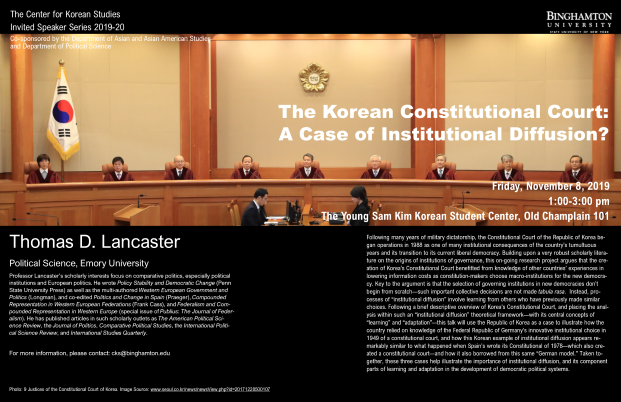The Center for Korean Studies sponsors lectures, exhibits, teacher workshops and cultural performances throughout the year. These events are designed to encourage economic, political and cultural understanding of Korea among members of the Binghamton University community and the public.
World Language: Initiative to Spotlight Korean Linguistics on a Global Stage:
A new three-year grant for more than $200,000 from the South Korean government will help spotlight the language and its impact both in the region and larger world. READ MORE
Center for Korean Studies Public Events
CKS Korean Studies Symposium in 2024: Korea at the Crossroads
Time: Friday, April 12, 2024, 2:00 - 5:30 PM
Location: Alpern Conference Room (LN 2200), Binghamton Univeristy
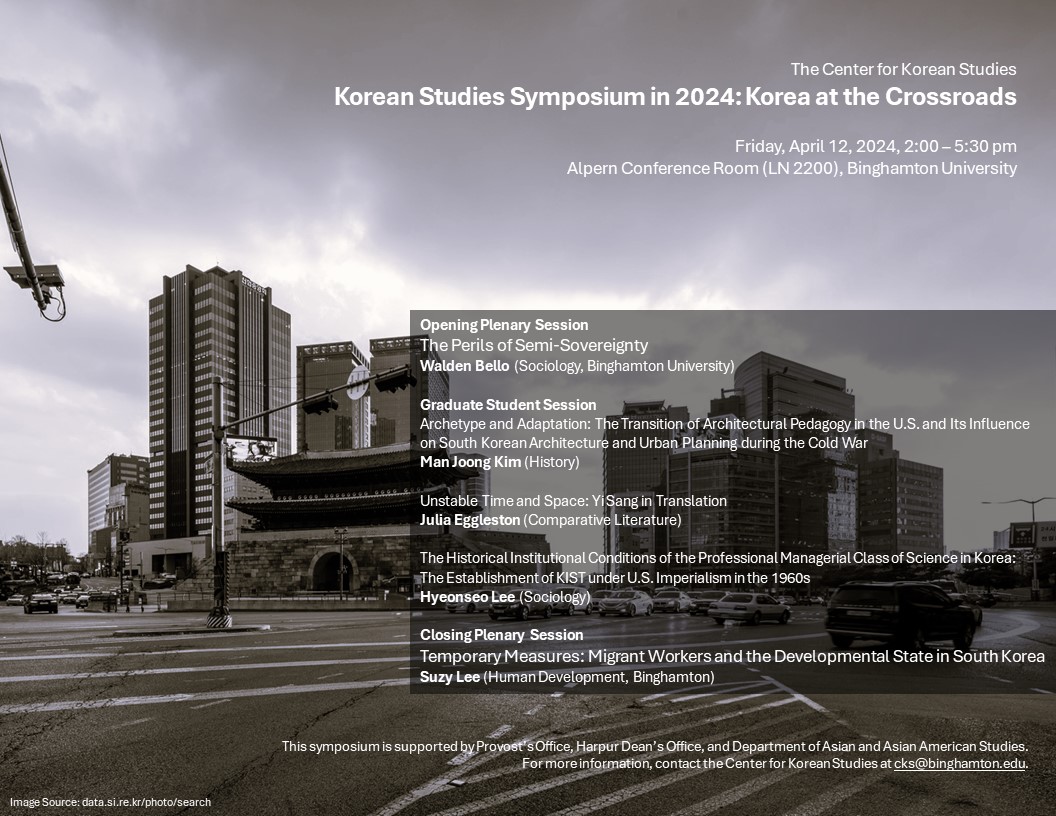
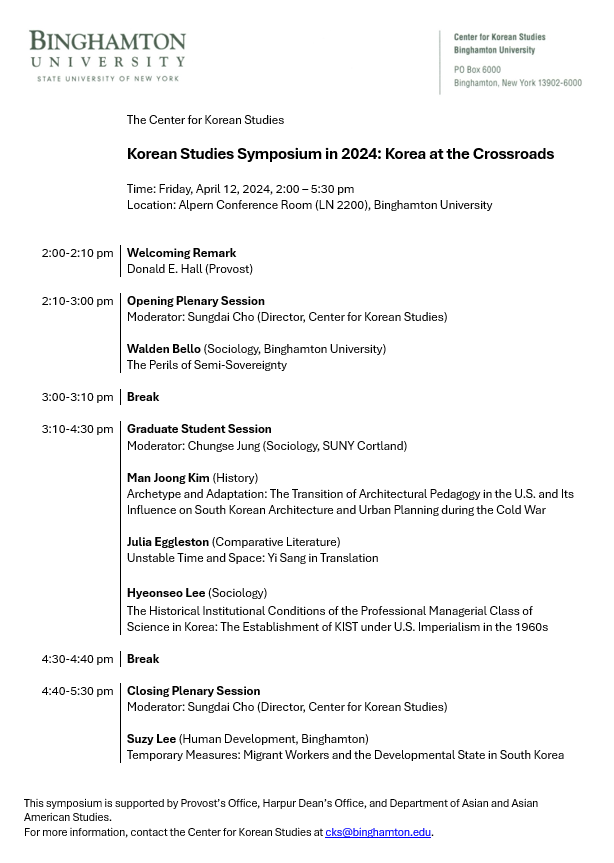
Korea Day K-FEST
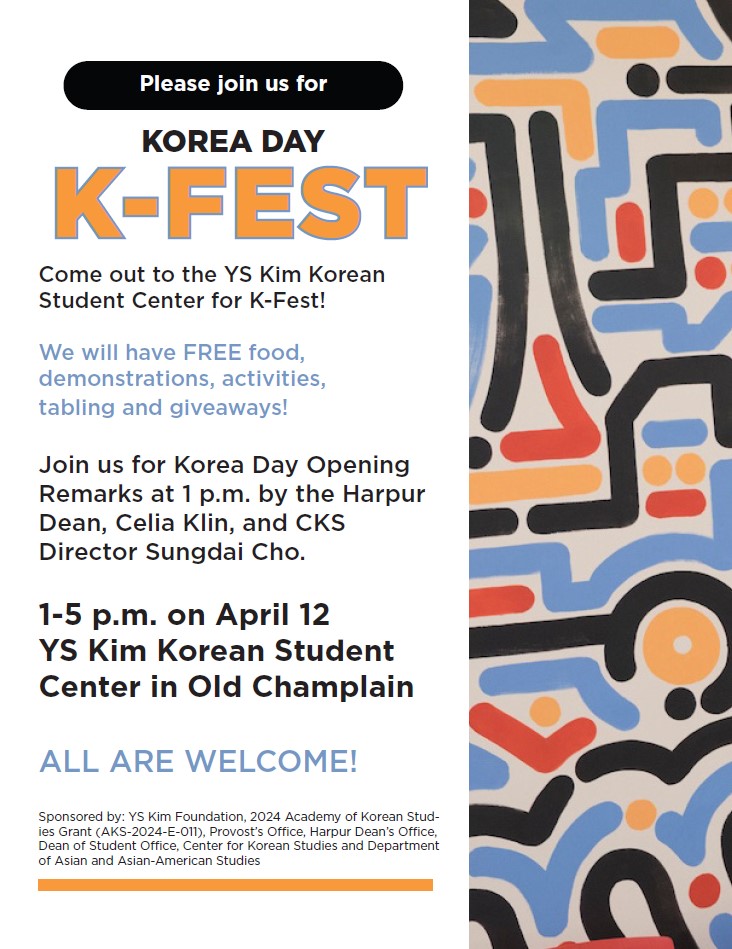
Joint Workshop: Culture Learning and Teaching in Applied Linguistics

CKS Colloquium Series on Korean Studies
The History of "Yan-Yun 16 Prefectures" during the Five Dynasties - Focusing on the Late Jin Dynasty, 936-947.
Chang Wook Lee (Visiting Scholar, History Department, Binghamton University/Northeast Asian History Foundation, South Korea)
November 10, 2023. 4:00 – 5:30 PM, OH-101 (The YS Kim Korean Student Center)
Historically, “Yan-Yun 16 Prefectures (燕雲16州)” were some of the important strategic places in early imperial China. These areas, which started in modern day Datong (大同) and ended in Tianjin (天津), included the capital city, Beijing (北京) and were just below the location of the Great Wall (長城). The main reason why the “Yan-Yun 16 Prefectures” were created by the imperial Chinese government was to better defend the border from threatening nomadic tribes such as the Xiongnu (匈奴), Xianbei (鮮卑), Youran (柔然), Turks (突厥) and Khitans (契丹), who had consistently attempted to break into the economically and culturally prospering Chinese empire. In other words, imperial China installed the prefectures as major military bases to solidify state security. Although there are many past studies on the “Yan-Yun 16 Prefectures,” there are still many un-answered historical questions, including why the Later Jin (後晉) had ceded this strategic area to the Khitan Empire. More specifically, why the first emperor of the Later Jin agreed to this bad policy decision made by his main political advisor Sang Weihan (桑維翰)? And Why did Sang himself, who was one of the top elites in the Chinese Empire, made such a suggestion to the emperor? Finally, during the cessation of the prefectures to the Khitans, what was the position and role of the military warlords, Liu Zhiyuan (劉知遠) and Zhao Dejun (趙德鈞)? In order to answer these questions, this presentation is delved into the historical background of the “Yan-Yun 16 Prefectures” in the first part and examines the strategic importance of these areas from the Qin-Han (秦漢) through late Tang (唐後期) dynasties. Following this, the presentation investigates the main reasons as to why the Later Jin ceded the prefectures to the Khitan empire through carefully analyzing the roles of four individuals, specifically emperor Shi Jingtang (石敬塘), Sang Weihan, Liu Zhiyuan and Zhao Dejun. Through the re-examination of the “Yan-Yun 16 Prefectures,” this presentation hopes to make an academic contribution to the scholarly world and help us understand the politically / militarily significant areas in imperial Chinese history.
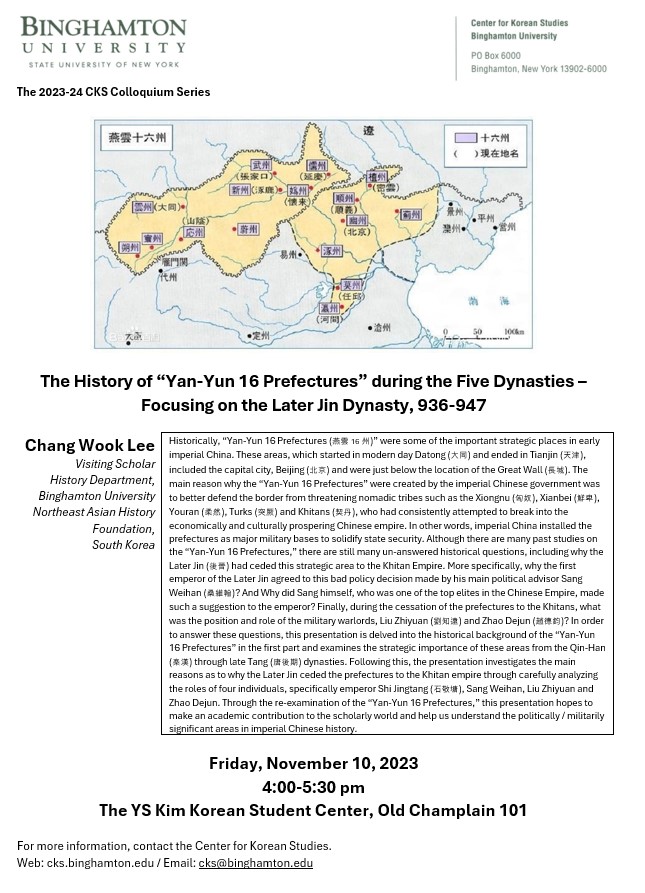
Behind Story of the Korean TV Industry: K-Wave and the Evolution of TV Show
Joonsoo Kim (Program Director, SBS, South Korea)
May 4, 2023. 4:30 - 6:00 PM, OH-101 (The YS Kim Korean Student Center)
Joonsoo Kim (김준수) is a Korean television program director, best known for creating and producing the popular observation-reality shows, Baek Jong-won's Alley Restaurant (백종원의 골목 식당), Baek Jong-won's Food Truck (백종원의 푸드 트럭), and Baek Jong-won's Top 3 Chefs (백종원의 3대 천왕). During his years in SBS, his filmography includes many popular and experimental TV variety shows, such as Global Junior Show (스타 주니어쇼 붕어빵), People Looking for a Laugh (웃음을 찾는 사람들), Star King (놀라운 대회 스타킹), Ecovillage: Merry House (에코 빌리지 즐거운가), Oh! My Baby (오 마이 베이비), Law of the Jungle (정글의 법칙), and SBS Entertainment Awards (SBS 연예 대상). In particular, Baek Jong-won's Top 3 Chefs was one of the first TV programs which addresses in earnest "Cookbang" in the three major TV networks, KBS, MBC, and SBS, in Korea. In his trilogy of Baek Jong-won, Mukbang and Cookbang have become major trends in Korean reality-variety TV show. Beyond watching, consuming Mukbang and Cookbang has now turned into a cultural phenomenon not only in Korea but also in global Asia.
Born and raised in Seoul, Korea, Joonsoo graduated from Yonsei University in Communication and now he lives and works in Seoul, Korea.
CKS Invited Speaker Series
The Korean Constitutional Court: A Case of Institutional Diffusion?
Thomas Lancaster (Professor in Political Science, Emory University)
November 8, 2019. 1:00 – 3:00 PM, OH-101 (The YS Kim Korean Student Center)
Following many years of military dictatorship, the Constitutional Court of the Republic of Korea began operations in 1988 as one of many institutional consequences of the country’s tumultuous years and its transition to its current liberal democracy. Building upon a very robust scholarly literature on the origins of institutions of governance, this on-going research project argues that the creation of Korea’s Constitutional Court benefitted from knowledge of other countries’ experiences in lowering information costs as constitution-makers choose macro-institutions for the new democracy. Key to the argument is that the selection of governing institutions in new democracies don’t begin from scratch—such important collective decisions are not made tabula rasa. Instead, processes of “institutional diffusion” involve learning from others who have previously made similar choices. Following a brief descriptive overview of Korea’s Constitutional Court, and placing the analysis within such an “institutional diffusion” theoretical framework—with its central concepts of “learning” and “adaptation”—this talk will use the Republic of Korea as a case to illustrate how the country relied on knowledge of the Federal Republic of Germany’s innovative institutional choice in 1949 of a constitutional court, and how this Korean example of institutional diffusion appears remarkably similar to what happened when Spain’s wrote its Constitutional of 1978—which also created a constitutional court—and how it also borrowed from this same “German model.” Taken together, these three cases help illustrate the importance of institutional diffusion, and its component parts of learning and adaptation in the development of democratic political systems.
